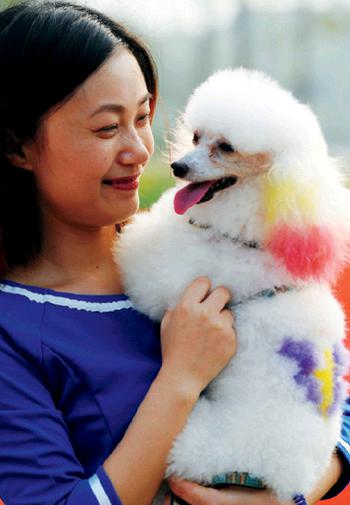Part of the Family
By+Xia+Yuanyuan
Zheng Yu is addicted to cats. Her childhood dream to keep a cat was finally realized last year when she started to work and got her own apartment. However, over the course of several months, Zheng has completely changed her understanding of keeping a cat.
She never knew that domestic cats had spawned an entire industry with a range of products and services that beggars belief. Toys, nail clippers, fur care powder, poop scoopers, hygiene products and furniture are among some of them. “Its totally beyond my imagination,” Zheng told ChinAfrica.
Zheng is part of the growing legion of pet owners across China, fueling an unprecedented boom in this industry. According to a white paper jointly published in 2017 by the Chinese Pet Products Association and other organizations, 134 billion yuan ($21.4 billion) was spent in Chinas pet industry in 2017, up 30.9 percent year on year. The figure is expected to go up to 200 billion yuan ($31.9 billion) by 2020.
Emotional comfort
Chen Xufeng runs his Xiaowo Pet Shop in Beijing, which sells a variety of pets including cats, dogs, rabbits, goldfish, turtles and even snakes and lizards.
He told ChinAfrica that his customers range from children to seniors. “In big cities, owners always treat pets as their family members. Pets bring companionship,”he noted.
Wang Zhiyu, a 29-year-old editor, agrees with Chen. “Jiumi (the name of her cat) makes me feel less lonely as I am living in Beijing alone. She is like part of my family,”she said. For seniors, pets make up for the gap left by children who work afar from home. They can channel their affection into caring for their four-legged friends, while also generously spending money on their food, health and daily necessities.
Although people have different reasons for keeping pets, most are seeking emotional comfort. China has one of the worlds lowest birth rates, and a growing number of middle-class couples are choosing to lavish their time and emotion on pets rather than children. In addition, China is home to the worlds fastest-growing aging population. A total of 480 million people aged 60 and above will account for about 25 percent of the population by 2050, according to National Bureau of Statistics of China. Their furry friends can offer alternative companionship to the absence of distant children.
A lucrative market
The growing number of pet owners in China is more willing to splash out on their pets now than they did in the past. And the focus has been widened from just material offerings to veterinary services.
As the “mother” of a poodle, Li Fan takes her “son” Dingding to the dog parlor salon for grooming and a healthy check every two months. Each visit costs about 150 yuan($23.9). Last year, Lis pet bills including dog food was around 4,000 yuan ($639.4). She also paid about 600 yuan ($95.9) to veteri- narians for grooming services that includes teeth brushing.
In Chens shop, pet owners could find everything from branded food and imported medicine to lifestyle-related products like beauty items and pet garments. Services include clinics, photography, skills training and pet hotels.
According to the 2016 White Paper on Pet Industry in China, published by Guangzhou-based Yourpet Research Institute, pet owners spent the most on food, healthcare and health products, with food purchases accounting for 35 percent of the total. On average, dog food sets owners back 6,436 yuan ($1,028.8) per year per dog, which is higher than the 1,689 yuan ($269.9) shelled out for a cat.
Chinese citizens growing pet attraction has now launched a new trend. In an office building located in Beijings Zhongguancun Street is Cappucimeow, a fashionable cat café attracting like-minded customers. They sit in groups, sipping cappuccinos and chatting, while seven cats, including a British Shorthair and a Siamese, strut around the café, rubbing themselves on appreciative legs and enjoying all the attention.
“My major reason coming to the café is for the cats. I love cats, but I dont have enough time to keep one. This café is a good place to enjoy leisure time with these lovely creatures,” Ni Li, a customer told ChinAfrica.
Compared with traditional ones, a cat caféspends additional 10,000 yuan ($1,598.9) on pet food and other necessities. However, they can recoup this by making a profit selling foods and beverages to their customers.
Virtual pets
Apart from living pets, Chinese peoples love for pets has spread online. Some social media accounts opened in the name of cats or dogs are followed by a large number of fans. For example, Xiaomajia, a user of Weibo, a Chinese Twitter-like micro blogging website, boasts more than 29 million followers by updating daily photos of his cat Duanwu and dog Niuniu. Each of his posts enriches him by about 20,000 yuan($3,197.8) via advertisements.
“I am a fan of Niuniu. It is as if I am keeping a dog as I watch pictures and videos everyday about her through Weibo,” said Luo Ziqing, a follower of Xiaomajia in Weibo.
Besides, Chinese affection for pets has also boosted the gaming industry. A recent favorite is a virtual pet frog. The game, named Travel Frog, is extremely popular among young Chinese. Users keep a frog online and give him a name. From time to time, players tap their phones to check if their pet frog has eaten, slept, gone out to meet friends or traveled.
Some players said the game helps them learn about parenthood. “Taking good care of my frog is just like taking good care of my child,” said Yang Meichen, who works in Beijing. “It arouses my maternal love.”

